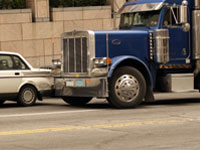
Trucking accidents are vehicle collisions that involve eighteen-wheelers, tractor-trailers, and other commercial vehicles that cause property damage or personal injury. Statistics by the Federal Motor Carrier Safety Administration show that collisions involving large commercial trucks in one year caused 287,000 claims of property damage, 4,321 deaths, and 77,000 injuries. Since commercial trucks are usually much larger than the vehicles with which they collide, the damage caused to the smaller vehicle is normally much more severe. Although large trucks cause an insignificant portion of accidents on highways, the size and speed of the trucks increase the risk of serious damage. The following will explore how tractor-trailer collisions are treated in court and highlight the difference between truck and car accidents.
Court Cases Involving Truck Collisions
A person who is injured or has suffered property damage due to a tractor-trailer collision that is not their fault is legally allowed to receive compensation that will return them to their former status- physically and financially. The person injured or whose vehicle is damaged by a truck driver can recover damages by suing the persons involved. Similar to car accidents, victims of trucking accidents have the right to receive compensation for rehabilitation costs, medical care, domestic services, loss of future earning capacity, and loss of earnings. The victim of an accident can also claim damages for pain and suffering, emotional suffering, disfigurement, and loss of consortium (a legal phrase meaning the loss of any future benefit to a victim’s family as a result of being deprived of that family member).
Consider a case where a truck driver makes an improper turn and causes a fatal injury. As an example, we’ll think of the plaintiffs as the family of a man who is killed after striking the back of a tractor-trailer that is dangerously making a turn at night. The truck, possibly unseen by the victim, blocked two traffic lanes on the route that the father normally traveled to work.
Furthermore, some of the tractor’s lights are not functioning and the trailer does not have reflective tape. After the claimants’ accident lawyer files for and wins a personal injury suit or other possible suits such as wrongful death, the defendant and their insurance company will be required to pay compensation for personal injury, loss of consortium, and other recompense as determined by the courts. Depending on the age of the victim, current or future earning ability, and general health, the damage award can vary.
Difference Between Tractor-Trailer Collisions and Car Accidents
The main differences between a tractor-trailer collision and a car accident lie in the extent of injuries and the level of training. A semi-truck that is loaded to full capacity weighs over 80,000 pounds while the average car weighs 3,000 pounds. Accidents between trucks and cars or regular-sized trucks result in serious injuries which is the reason why truck drivers are required to have insurance that comes with large liability limits. When a policy has a higher liability limit than normal, it means that an injured party is able to claim more money. Consider a case where a truck driver collides with a vehicle and injures a third party who happens to be at the scene of the accident. In such a scenario, if the injured party suffers permanent injury from the incident, the truck driver’s insurance company may be required to pay a possibly huge sum of money to reimburse medical expenses (both present and future), loss of earning capacity, loss of employment, and pain and suffering.
Truck drivers are required to go through special training and education as well as specific instructions regarding the kind of load their truck is carrying. Commercial truck drivers should have a commercial driver’s license which reflects their training and the types of loads they are allowed to carry. If a truck driver is involved in an accident and it is established that they do not have the right qualifications, the hiring company may be found liable for negligence in training and hiring.
If you are involved in a truck accident it is advisable to consult an accident lawyer to help with the complex task of evaluating and investigating the case. A qualified attorney will also help you file the appropriate documents and will improve your chances of receiving fair compensation from the defendant’s insurance company.

